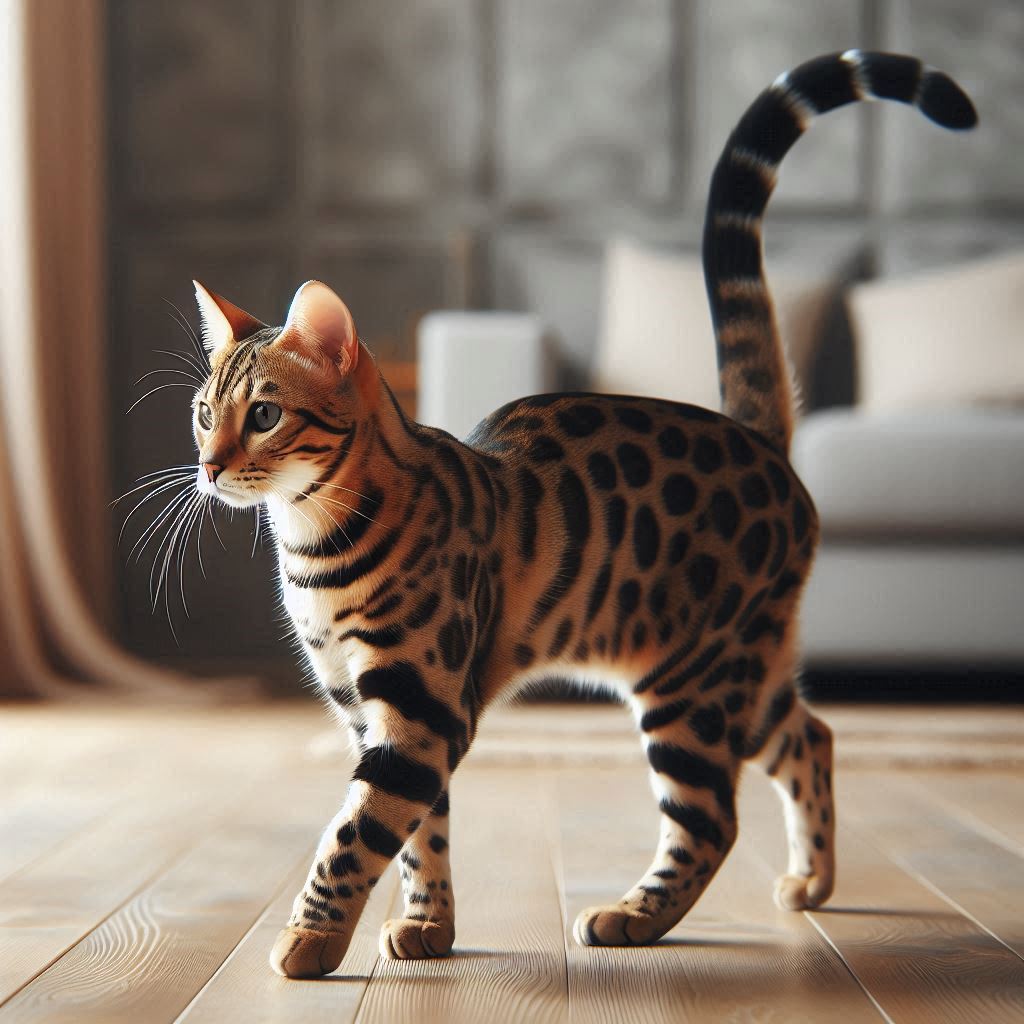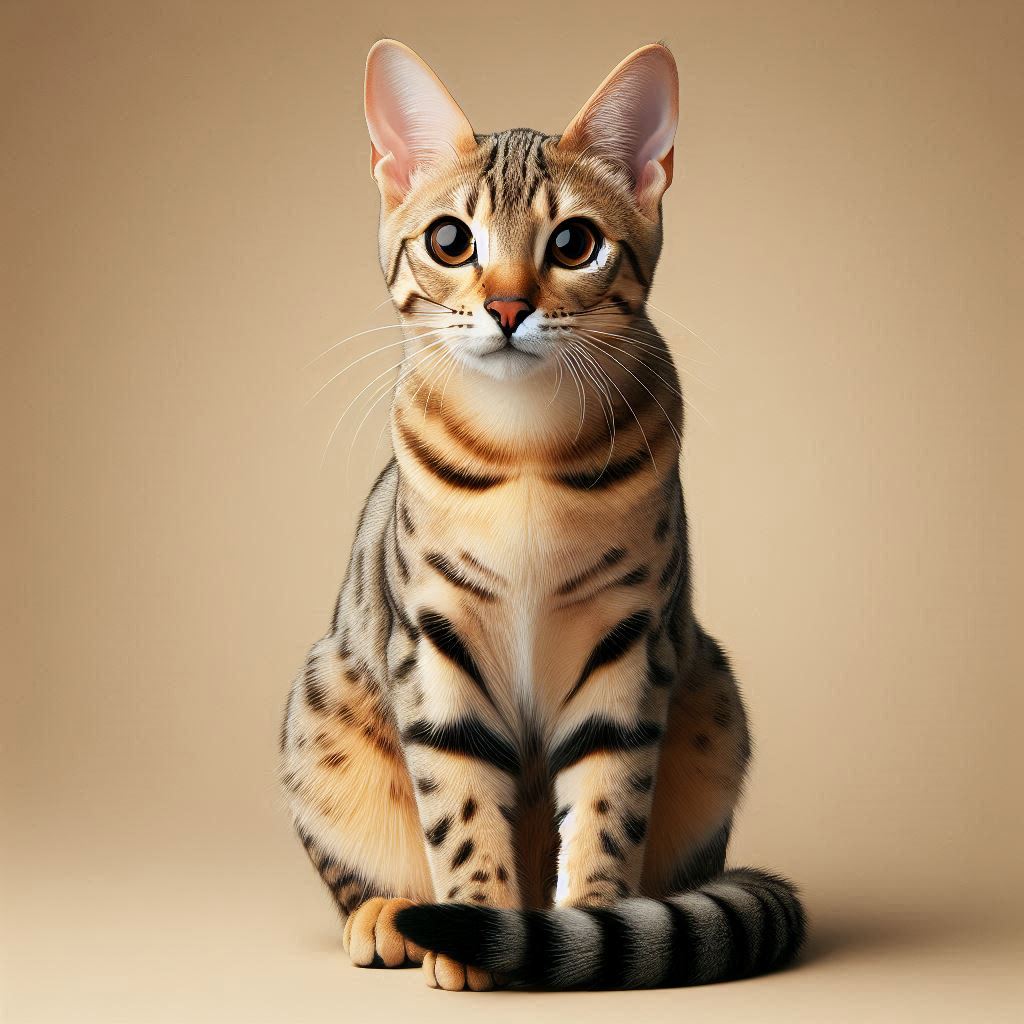The Ocicat is a captivating and unique cat breed known for its wild appearance and spotted coat, which resembles that of a wild ocelot. Despite their exotic look, Ocicats are 100% domesticated cats with affectionate and social personalities. This breed combines beauty, intelligence, and a love for companionship, making it a perfect choice for families, singles, and seniors alike.
History and Origin
The Ocicat breed originated in the United States in the 1960s. The breed was created by accident when Virginia Daly, an American breeder, attempted to produce a Siamese cat with an Abyssinian coat color. The unexpected result was a kitten with stunning spots, which led to further breeding to establish the Ocicat as a recognized breed. By selectively crossing Siamese, Abyssinian, and American Shorthair cats, breeders developed the Ocicat’s distinct look. The breed was officially recognized by the Cat Fanciers’ Association (CFA) in 1987 and has since gained popularity for its wild appearance and gentle nature.
Physical Characteristics
The Ocicat stands out for its muscular build, athleticism, and beautiful, spotted coat that resembles wild cats.
- Size: Ocicats are medium to large cats, typically weighing between 8 to 15 pounds. They are strong and muscular, with a solid and athletic appearance.
- Coat and Color: Ocicats have a short, sleek coat that lies close to their bodies and requires minimal grooming. Their spotted coat can come in various colors, including tawny, chocolate, cinnamon, blue, lavender, and fawn, each with dark spots contrasting against a lighter background.
- Face and Eyes: The Ocicat’s large, almond-shaped eyes give it an alert, intelligent expression. Eye color varies widely and may include shades of gold, green, or blue.
- Tail: Ocicats have a long, tapered tail with dark rings, which enhances their wild and exotic appearance.
Personality and Temperament
Ocicats are known for their playful, outgoing, and affectionate personalities. They are highly social and tend to thrive in interactive environments where they can engage with their human family.
Playful and Energetic:
With their muscular build and athletic abilities, Ocicats are active cats that enjoy playtime. They love interactive toys, climbing, and exploring, making them well-suited for homes with ample play areas or tall cat trees.
Affectionate and Loyal:
Ocicats form strong bonds with their families and are known to be loyal companions. They enjoy being around people and will often follow their owners from room to room. Their affectionate nature makes them ideal lap cats.
Intelligent and Trainable:
Ocicats are highly intelligent and can be easily trained. Many owners find that they can teach their Ocicats to walk on a leash, perform tricks, and even fetch. They are quick learners and respond well to positive reinforcement.
Sociable and Friendly:
Ocicats are known to be social cats and generally get along well with children, other pets, and even strangers. They thrive in lively households and enjoy being part of family activities.

Grooming and Care
The Ocicat is a low-maintenance breed, with a short coat that requires minimal grooming.
- Brushing: Weekly brushing is usually enough to keep their coat shiny and to reduce shedding. A grooming glove or soft brush works well to remove loose fur.
- Dental Care: Like all cats, Ocicats benefit from regular dental care. Brushing their teeth or using dental treats can help maintain their oral health.
- Nail Trimming and Ear Cleaning: Regular nail trimming and occasional ear cleaning are recommended to keep them comfortable and healthy.
Health and Lifespan
The Ocicat is a generally healthy breed with a lifespan of 12 to 18 years. However, they may be prone to some genetic health issues that can be monitored through regular veterinary care.
- Hypertrophic Cardiomyopathy (HCM): This is a heart condition that can occur in Ocicats, so regular heart check-ups are recommended.
- Renal or Kidney Issues: Ocicats may have a predisposition to kidney problems, so routine vet visits and proper hydration are essential.
With routine vet check-ups, a balanced diet, and an active lifestyle, Ocicats can enjoy a long, healthy life.
Living with an Ocicat Cat
Ocicats are adaptable and can thrive in a variety of home environments, from apartments to larger homes. They are well-suited for families and households where someone is often around, as they do not like being left alone for extended periods. Ocicats are intelligent and may become bored if not given sufficient mental and physical stimulation, so interactive toys and regular playtime are beneficial.
Because Ocicats are naturally sociable, they do well in homes with other pets. They enjoy having playmates, whether it’s another cat, a dog, or children who enjoy interactive games. Ocicats are often described as “dog-like” in their loyalty and may even learn to play fetch or enjoy going on walks with a leash and harness.
Why Choose an Ocicat Cat?
The Ocicat is a great choice for those seeking a loyal, affectionate, and intelligent feline companion. Their wild appearance adds a unique charm to their personality, while their friendly, playful nature makes them wonderful additions to most households. Ocicats are versatile and can easily adapt to a variety of family structures, making them ideal for active families, singles, and even seniors who appreciate an interactive, loving pet.
Conclusion
The Ocicat combines the best of both worlds: a wild, exotic look with a gentle, affectionate personality. This loyal and loving breed offers a high level of intelligence, playfulness, and sociability that makes it a wonderful pet for many types of homes. With minimal grooming needs and a friendly disposition, the Ocicat is a captivating companion that will quickly become a cherished member of any family. For anyone looking to add a bit of wild beauty to their home without sacrificing the warmth of a domesticated pet, the Ocicat is a perfect choice.



